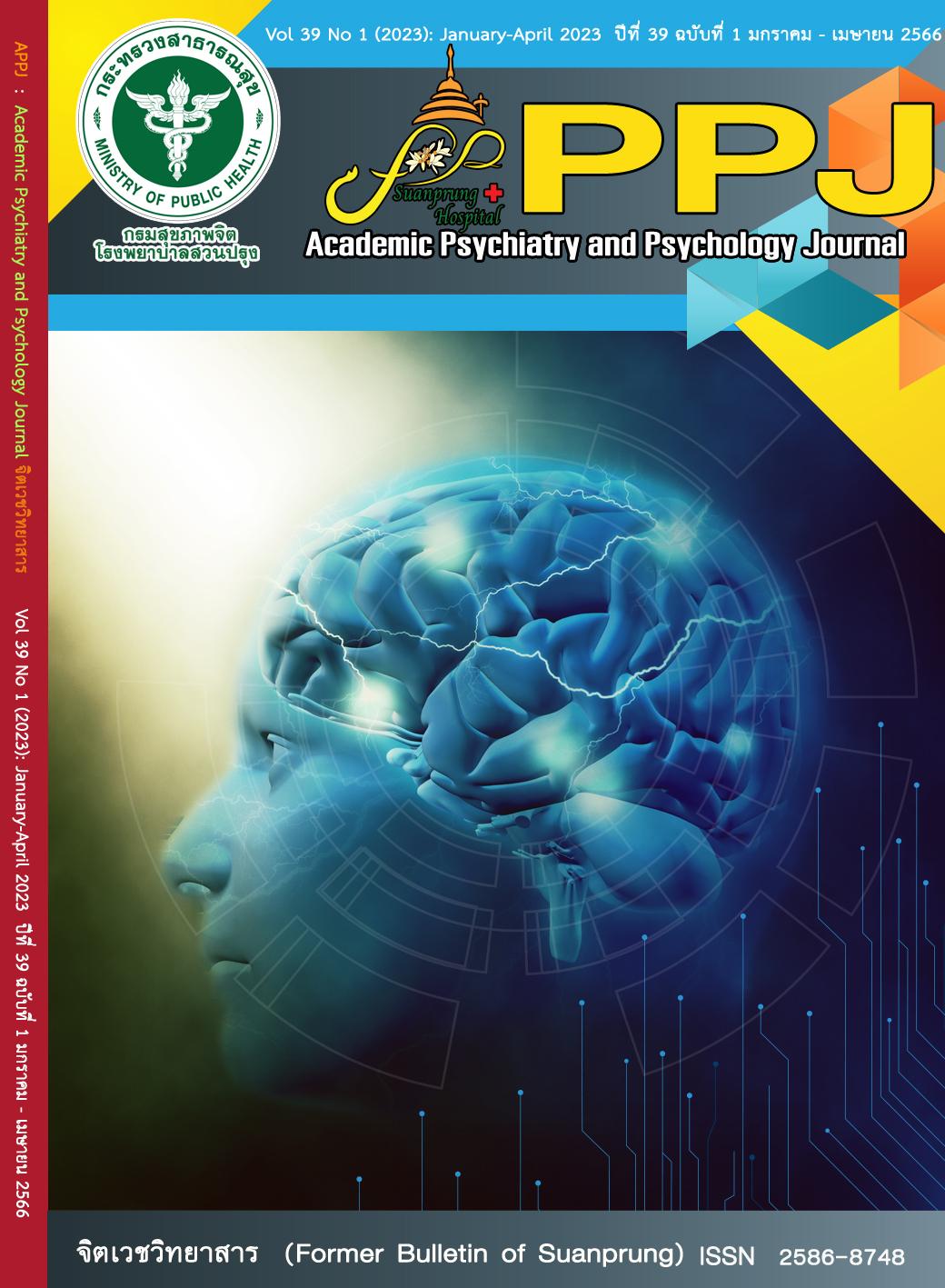Prevalence and factors affecting stress and depression of parents who have children aged 5-11 years in post-COVID-19 pandemic situation in Muang District, Ubon Ratchathani
Main Article Content
Abstract
Objectives: To determine the prevalence and factors related to stress and depression among parents who have children aged 5-11 years in Muang District, Ubon Ratchathani Province.
Methods: This was a cross-sectional study on 1,100 parents with children aged 5-11 years who are enrolled in 6 schools in Muang District, Ubon Ratchathani Province. Data were collected in July 2022 using an online questionnaire. Stress was assessed by the ST5, and depression was assessed by the 2Q and 9Q. Factors affecting stress and depression were analyzed using univariate and multivariate logistic regression.
Results: Parents’ prevalence of stress and depression was 32.2% and 21.7%, respectively. Factors affecting stress were: children 5-11 years in families who caught COVID-19 (OR=1.40, 95%CI=1.04-1.89, p-value=0.026), anxiety about getting COVID-19 (OR=2.35, 95%CI=1.56-3.53, p-value<0.001), low level of confidence in the school's preventive measures (OR=1.97, 95%CI=1.22-3.16, p-value=0.005), and anti-infection behavior to a degree that should be improved (OR=1.83, 95%CI=1.22-2.73, p-value=0.003). Factors contributing to depression include: lack of occupation (OR=1.89, 95%CI=1.16-3.07, p-value=0.010), anxiety about getting COVID-19 (OR=1.72, 95%CI=1.21-2.45, p-value= 0.003), lack of hospital campaigns to promote vaccination (OR=1.42, 95%CI=1.03-1.96, p-value=0.032), and anti-infection behavior to a degree that should be improved (OR= 1.80, 95%CI=1.18-2.76, p-value=0.007).
Conclusions: The prevalence of stress and depression among parents was 32.2 and 21.7 percent, respectively. The factors that affect stress and depression were anxiety about getting COVID-19 and anti-infection behavior to a degree that should be improved. Therefore, mental health care services should be taken for parents with high levels of stress and depression, and there should be activities to promote health literacy to prevent communicable diseases.
Article Details

This work is licensed under a Creative Commons Attribution-NonCommercial-NoDerivatives 4.0 International License.
บทความหลังผ่านการปรับแก้จากกองบรรณาธิการแล้ว เป็นลิขสิทธ์ของวารสารจิตเวชวิทยาสาร โรงพยาบาลสวนปรุง กรมสุขภาพจิต กระทรวงสาธารณสุข ห้ามเผยแพร่เพื่อประโยชน์ทางการค้าโดยไม่ได้รับอนุญาต แต่อนุญาตให้เผยแพร่บทความดังกล่าวเพื่อประโยชน์ทางการศึกษาแก่ประชาชนทั่วไป ทั้งนี้กองบรรณาธิการไม่จำเป็นต้องเห็นด้วยกับบทความหรือข้อคิดเห็นใดๆ ที่ปรากฏในวารสารสวนปรุง
References
World Health Organization. Surveillance case definitions for human infection with novel coronavirus (nCoV): interim guidance v1, January 2020. [Internet]. 2020 [Cited 2022 May 4]. Available from: https://apps.who.int/iris/handle/10665
CDC. Science Brief: Evidence Used to Update the List of Underlying Medical Conditions Associated with Higher Risk for Severe COVID-19 [Internet]. 2020 [cited 2022 April, 14]. Available from: https://www.cdc.gov/coronavirus/2019-ncov/science/science-briefs/underlying-evidence-table.html
Center for COVID-19 Situation Administration (CCSA). Coronavirus disease situation 2019 on June 30, 2022. [Internet]. 2022 [Cited 2022 August, 4]. Available from: https://media.thaigov.go.th/uploads/public_img/source/300465.pdf (in Thai)
Dai LL, Wang X, Jiang TC, Li PF, Wang Y, Wu SJ, et al. Anxiety and depressive symptoms among COVID-19 patients in Jianghan Fanghan Fangcang Shelter Hospital inWuhan, China. Plos One. 2020;15(8): e0238416. doi: 10.1371/journal.pone.0238416.
Sawangsri W, Hasitawech N, Yamma C, Rattanatrai N, Juengsiragulwit D. Prevalence of perceived stress and depression and their associated factors among COVID-19 patients in Bangkok. Journal of Mental Health of Thailand 2021; 29(2):114-24. (in Thai)
Elbay RY, Kurtulmus A, Arpscioglu S, Karadere E. Depression, anxiety, stress levels of physicians and associate factors in Covid-19 pandemics. Psychiatry Res. 2020;290: 113-30. doi:10.1016/j.psychres.2020.113130.
Sangsirilak A, Sangsirilak S. Stress and Depressed Mood in Healthcare Workers During COVID-19 Outbreak. J Psychiatr Assoc Thailand 2020; 65(4): 400-408. (in Thai)
Wijitraphan T. Prevalence and factors associated with stress and depression in COVID-19 pandemic among residents of Tung Seaw primary care clinic, Sanpathong District, Chiang Mai Province. Journal of Mental Health of Thailand 2021; 29(1):12-21. (in Thai)
Thailand Development Research Institute. The impact of covid-19 towards households with young children. [Internet]. 2022 [Cited 2022 October, 4]. Available from: https://tdri.or.th/2020/08/covid19-impact-early-child/. (in Thai)
Johnson MS, Skjerdingstad N, Ebrahimi OV, Hoffart A, Johnson SU. Parenting in a Pandemic: Parental stress, anxiety and depression among parents during the government‐initiated physical distancing measures following the first wave of COVID‐19. Stress and Health 2021;1–16. doi: 10.1002/smi.3120
Prime H, Wade M, Browne DT. Risk and resilience in family well-being during the COVID-19 pandemic. American Psychologist 2020; 75(5): 631–643.
Cusinato M, Iannattone S, Spoto A, Poli M, Moretti C, Gatta M, et al. Stress, Resilience, and Well-Being in Italian Children and Their Parents during the COVID-19 Pandemic. Int J Environ Res Public Health 2020 Nov; 17(22): 8297. doi: 10.3390/ijerph17228297
Cluver L, Lachman JM, Sherr L, Wessels I, Krug E, Rakotomalala S, et al. Parenting in a time of COVID-19. the Lancet 2020; 395(10231): e64.
Park YJ, Choe YJ, Park O, Park SY, Kim YM, Kim J, et al. Contact tracing during coronavirus disease outbreak, South Korea, 2020. Emerg Infect Dis 2020; 26(10): 2465–2468.
Ubon Ratchatani Provincial Health Office. MIS Covid Ubon. [Internet]. 2022 [cited 2022 August, 14]. Available from: http://www.phoubon.in.th/ (in Thai)
Kathirvel N. Post COVID-19 pandemic mental health challenges. Asian Journal of Psychiatry 2020; 53(102430): 1-2.
Pelaez M, Novak G. Returning to School: Separation Problems and Anxiety in the Age of Pandemics. Behav Anal Pract. 2020; 13(3): 521–526. doi: 10.1007/s40617-020-00467-2
Chulabhorn Hospital. Suggestion on caring for children during the COVID-19 pandemic. [Internet]. 2022 [cited 2022 September, 17]. Available from: https://www.chulabhornhospital.com/page.php?name=1037(in Thai)
Silpakit O. Srithanya hospital Stress test questionnaire, ST-5. Journal of Mental Health of Thailand 2008; 16(3): 177-84. (in Thai)
Department of Mental Health, the Ministry of Public Health. Guidelines for using mental health tools for public health personnel in community hospitals (Chronic Disease Clinic) Revised Edition [Internet]. 2015 [cited 2022 August, 1]. Available from: http://envocc.ddc.moph.go.th/uploads/ประชุม/20-21_11_61/C_1.pdf (in Thai)
Rodríguez-Rey R, Garrido-Hernansaiz H, Collado S. Psychological impact and associated factors during the initial stage of the Coronavirus (COVID-19) pandemic among the general population in Spain. Front Psychol. 2020; 11: 1540. doi: 10.3389/fpsyg.2020.01540.
Suwanaphant K, Seedaket S, Vonok L, Assana S, Wawngam W, Kingsawad K, et al. Factors associated with stress due to corona virus diseases 2019 (COVID-19) pandemic among students of the Faculty of Public Health and Allied Health Sciences, Praboromarajchanok Institute. Journal of Health Science Research 2020; 14(2): 138-48. (in Thai)
Yaowakul D, Abdullakasim P, Maharachpong N. Health literacy on corona virus disease 2019 prevention behaviors of village health volunteers in region 6 health provider. Research and Development Health System Journal 2022; 15(1): 257-72. (in Thai)

